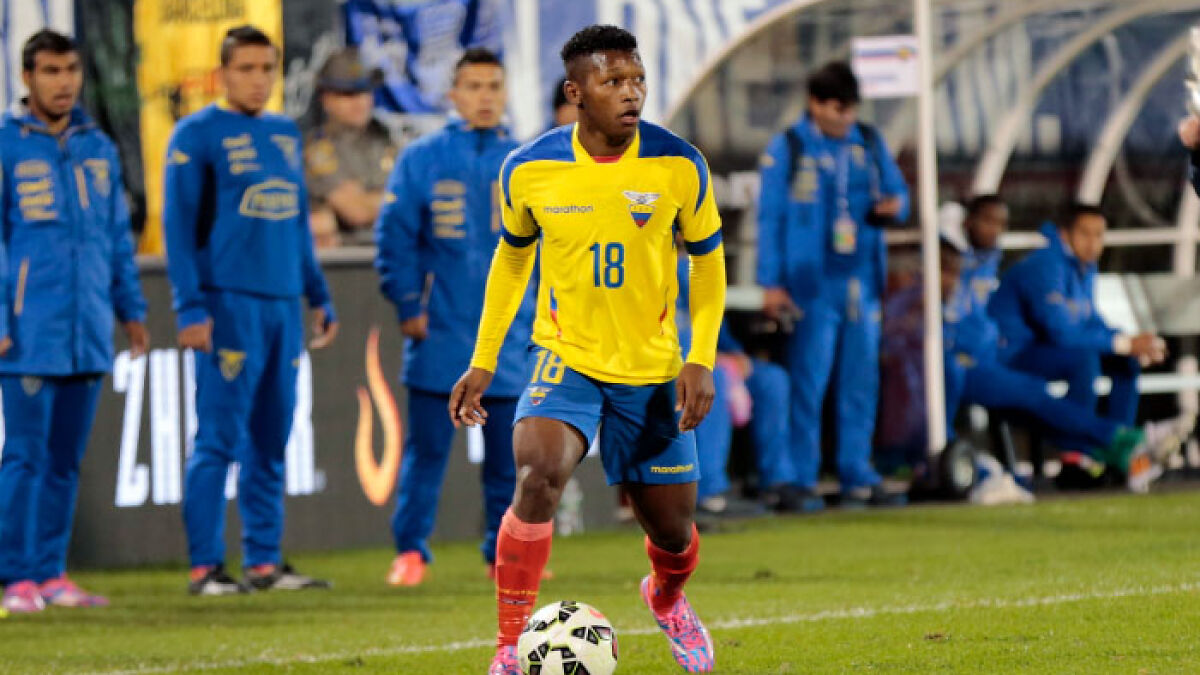
Ecuador’s Beautiful Game Turns Deadly As Gangsters Gun Down Soccer Players In Brutal Betting War
Having played every minute of his team’s last nine matches and with his next game a few days away, Ecuadorian professional soccer player Jonathan ‘Speedy’ González spent the afternoon of Friday, September 19, relaxing with family members at his home in the Vista al Mar neighborhood of coastal city Esmeraldas.
A former Ecuador international who had plied his trade in Mexico and Paraguay, the 31-year-old was in his second stint at second-tier club 22 de Julio and lived less than a mile from their stadium.
- Ecuadorian soccer players face deadly violence amid criminal betting wars linked to organized gangs.
- Jonathan González and others were killed for resisting match-fixing pressures tied to sports betting money-laundering schemes.
- Organized crime exploits soccer clubs and betting loopholes for money laundering, endangering players and the sport’s integrity.
- Ecuador’s homicide rate is soaring due to gang conflicts over trafficking routes, with soccer players increasingly targeted.
- Military crackdowns show limits: experts warn long-term solutions must address corruption and criminal networks beyond force.
At around 7 p.m., a man in bluegas-stationoveralls approached the home on a motorbike and opened fire.
Jonathan González playing for Ecuador in 2014. Image credits: Icon Sports Wire/Getty Images
Both González and his brother-in-law, Darío Batalla Quiñónez, were hit. González was killed at the scene, while Batalla died on the way to hospital.
Initial reports suggested they had been victims of a robbery gone wrong, but family members told local press that González had been receiving threats for weeks.
Days before his killing, unknown assailants had shot at his car.
The people behind the threats were reportedly members of an organized crime group known as Los Ganster, who had been pressuring González to help manipulate results as part of a money-laundering scheme tied to sports betting. Nine days before his death, his team was supposed to lose but drew 1–1.
He was “a good kid who died because of betting,” a 22 de Julio club employee told AFP.
En el hecho habría resultado herido Leandro Yépez, el club ya se pronunció ante el lamentable suceso, por ahora no hay información sobre una posible suspensión del cuentero pactado para este sábado ante Deportivo Quito
Tanto Yépez como Valencia fueron presentados horas antes https://t.co/K9Bk8pRw1xpic.twitter.com/mkpF2NiYPo
— Ligner Mendoza (@ligner_mendoza) September 11, 2025
His killing came just over a week after two other professional players were shot dead in a hotel in Manta, another Pacific port city 230 miles south of Esmeraldas.
In that attack, assassins dressed as police officers went room to room, killing five people, among them 25-year-old Maicol Valencia and 33-year-old Leandro Yépez—both newly signed to lower-league side Exapromo Costa FC. Local police said one of the players was the intended target.
While gambling links have not been established in that case, six suspects arrested for the attack were reported to be members of Los Choneros, a major criminal group of which Los Ganster is a faction.
In total, since Valencia and Yépez were murdered, seven current or former soccer players have been killed or injured in violence in Ecuador, with Batalla himself a former goalkeeper who enjoyed a 15-year career in Ecuador’s lower leagues.
Police raid a home during an early morning operation in search of a gang member in Esmeraldas, Ecuador. Image credits: John Moore/Getty Images
Meanwhile, on September 24, former top division youth player Jostin Alexander Mero Salvatierra was also shot and killed in Manta. That came eight days after current top division player Ariel Suarez was shot in the southern port city of Machala, where his team, Orense SC, is based.
In the latest act of violence, on 16 October, another former Ecuador international, Bryan ‘Cuco’ Angulo, who plays for second-tier club L.D.U. Portoviejo, was shot in the leg during an apparently failed assassination attempt as he entered training in the city of Portoviejo, 22 miles southeast of Manta.
The two perpetrators were captured after their getaway motorbike broke down and they were forced to try to flee on foot.
#Atención| Quedó registrado en video, el momento en que los sica4rios que at4caron al jugador de Liga de Portoviejo, Bryan Angulo, trataban de huir, pero la oportuna intervención de la Policía Nacional, logró la captura de los sujetos. Uno de ellos se encuentra herido.… pic.twitter.com/MPRwiTdbr8
— Diario El Mercurio (@elmercuriomanta) October 16, 2025
In the aftermath of the attack, the club issued a statement saying “several of our players have received threats related to the sporting event scheduled for this Friday, October 17, 2025, against the Búhos ULVR club,” referring to another second-tier club.
A sport plagued by corruption
In December 2023, U.S. Ambassador to Ecuador Michael Fitzpatrick accused criminal actors of “taking advantage of the national passion,” in reference to soccer.
“They use the team accounts, just as they use those of fictitious companies, to wash their faces as well as their money,” he said.
According to Prof. Renato Rivera, senior analyst at the Global Initiative against Transnational Organized Crime, the infiltration of professional football “is a relatively recent phenomenon” that began to attract attention around 2022.
“The case of Leandro Norero, who financed several criminal groups and was murdered in prison, showed how football clubs—especially second-division teams—are used for money laundering,” Rivera said.
Norero was reportedly decapitated during a prison massacre in October 2022. Investigations later revealed he used a series of companies, a football team, and betting operations to launder vast sums of illicit money.
Prof. Renato Rivera says some football clubs in Ecuador are used for money laundering. Image credits: Research Gate
Rivera explained that while gambling is technically prohibited in Ecuador, criminals exploit loopholes by processing large numbers of small transactions through “sports forecast” businesses.
“Through small deposits—what we call pitufeo (smurfing)—money enters the system without triggering any oversight,” he said.
“They’re legally constituted, but they don’t ask where the cash comes from. That’s what allows dirty money to circulate as if it were part of the formal economy.”
This blending of criminal finance with soccer has turned players and clubs into targets.
In December 2024, a video widely shared on social media showed armed men threatening players from second-tier team Chacaritas FC at gunpoint, apparently demanding they lose games.
Ecuadorian National Police detain a suspected narco trafficker in Tonsupa, Ecuador. Image credits: John Moore/Getty Images
According to local news outlet Primicias, an internal report produced by the Integrity and Anti-piracy Department of LigaPro, which oversees the first and second tiers of Ecuadorian soccer, identified at least four second-tier teams involved in manipulating games.
A country plunged into violence
For Glaeldys González Calanche, southern Andes analyst at the International Crisis Group, the killings of González, Valencia, and Yépez highlight “how organized crime has expanded into spaces not usually linked to criminality, like sports,” amid “a completely uncontrolled situation in terms of violence.”
“This year’s first semester broke homicide records, even beyond those registered in 2023, which was already the country’s most violent year ever,” she said. “If this trend continues, 2025 will now hold the record of being the deadliest in Ecuador’s history.”
Rivera agrees, warning that Ecuador’s homicide rate could hit 50 per 100,000 this year—more than eight times the 2018 rate, when Ecuador was among the safest nations in Latin America.
The six suspects who were arrested in connection with the murders of soccer players Maicol Valencia and Leandro Yépez in Manta. The six are believed to be members of Los Choneros. Image credits: Primicias
According to Adam Isacson, director for defense oversight at the Washington Office on Latin America, Ecuador’s security collapse is “unlike anything else in the hemisphere.”
“I can’t think of another country that’s seen violence and criminal activity rise so quickly,” he said. “Ten years ago, Ecuador was one of the most peaceful countries in the region. Now it’s normal to see events that would once have shocked the nation for weeks.”
For Isacson, the killing of soccer players is another symptom of that collapse. “It just shows how pervasive the deterioration is,” he said. “Any money-making stream, even something as small as small-team sports betting, is now carried out with extreme violence.”
A perfect storm for criminality
Experts point to overlapping causes: the 2016 peace deal in Colombia, which ended the FARC guerrilla group’s dominance over the Colombia-Ecuador border—a key thoroughfare for cocaine— and invited Mexican cartels to fill the void; the pandemic, which crippled state capacity; and the 2020 assassination of Los Choneros leader Jorge Luis ‘Rasquiña’ Zambrano, whose death shattered the Ecuadorian underworld’s balance of power.
That vacuum allowed Los Lobos—backed by Mexico’s Jalisco New Generation Cartel—to challenge the long-dominant Los Choneros, historically tied to the Sinaloa Cartel.
“Their involvement helped push Los Lobos to a place where they could challenge the centralized control that Los Choneros once had,” González said.
Jorge Luis ‘Rasquiña’ Zambrano was the leader of Los Choneros until his assassination in 2020. Image credits: RadioFarra957
According to Rivera, much of the bloodshed stems from criminal fragmentation, which sees competing groups use extreme violence to secure trafficking routes, often employing inexperienced assassins—with minors regularly used.
“Sometimes they go to kill one person and end up killing everyone present,” he said, referencing a massacre in Guayaquil on October 12, when two people were targeted, but six were killed and more than a dozen injured during a community soccer match.
Force alone will not fix Ecuador
That all of the attacks took place in or near port cities is no coincidence. These areas are central to the country’s criminal economy, serving as departure points for cocaine shipments to the U.S. and Europe.
Port cities, and especially Ecuador’s biggest port and most populous city of Guayaquil, have therefore become battlegrounds where rival factions fight for control of trafficking routes and laundering networks. The violence is not incidental but structural—and anyone caught in the middle is at risk, even professional soccer players.
Ecuador’s President Daniel Noboa has deployed the military to fight organized crime in the South American country. Image credits: Europa Press News/Getty Images
President Daniel Noboa’s iron-fist strategy, which includes deploying the military and designating 22 criminal groups as terrorist organizations—among them Los Choneros, Los Ganster, and Los Lobos—has exposed the limits of force in a state weakened by corruption and inequality.
“You can’t fight these groups with the same playbook used against street gangs,” said Isacson, comparing Noboa’s approach to Salvadoran President Nayib Bukele’s model.
“The Bukele strategy won’t work in Ecuador—it’s a bigger country, and these organizations move cocaine and gold across borders. They have infinitely more money and reach than MS-13 ever did. You can lock people up, but the business keeps running.”
Glaeldys González agreed: “The sole reliance on the military may bring temporary advances, but it’s not going to provide long-term stability or address the root causes driving this crisis.”
Noboa was surrounded by police and bodyguards while attending a soccer game between Ecuador and Argentina in Guayaquil in September 2025. Image credits: Franklin Jacome
Poll Question
Thanks! Check out the results:
1k+views
Share on Facebook

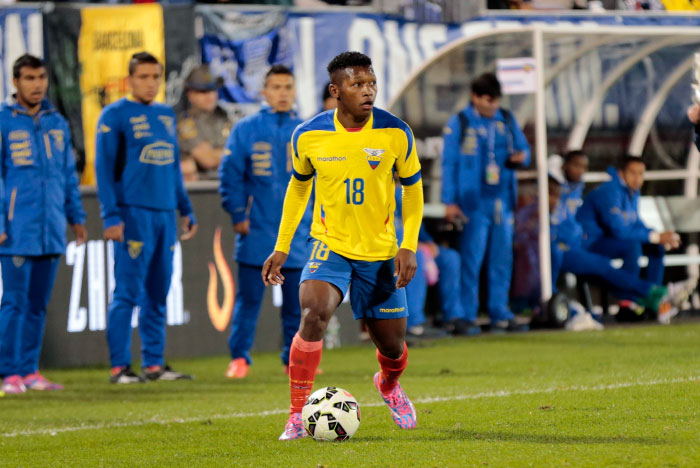
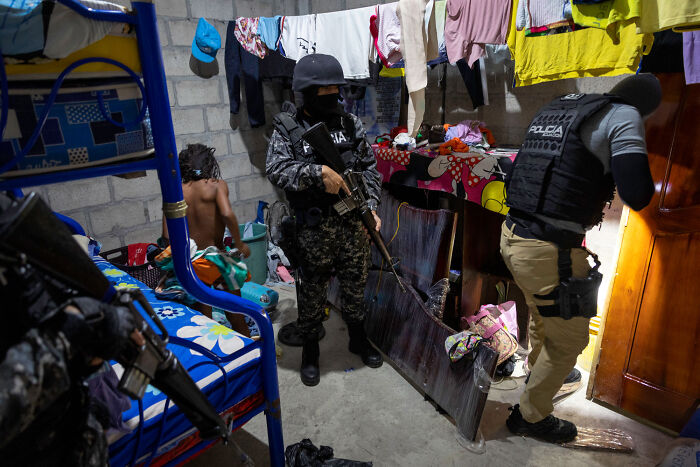

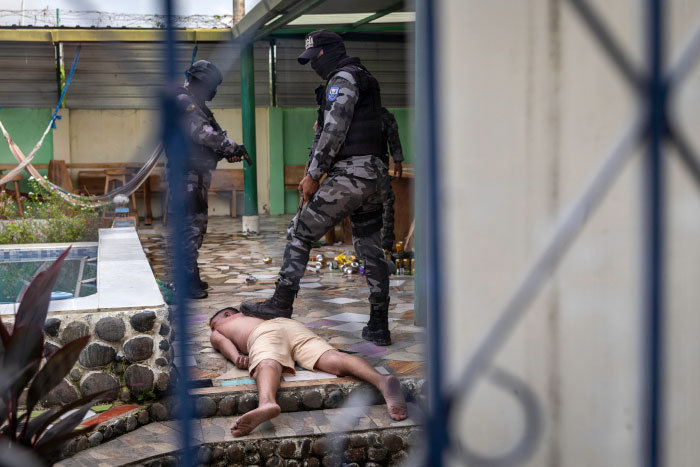
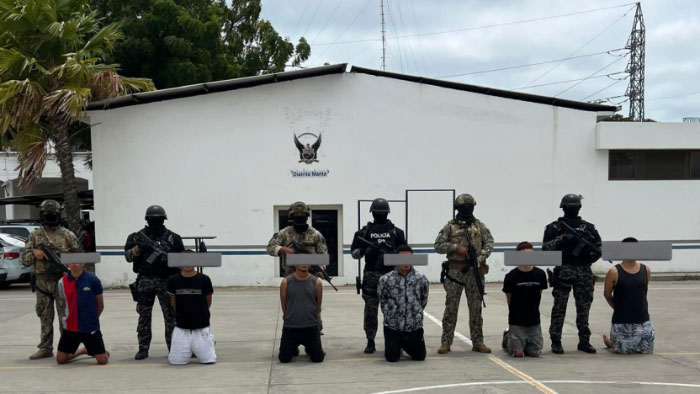
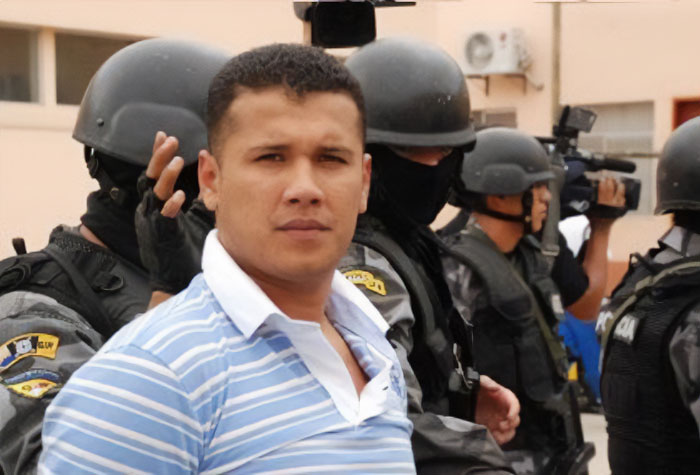
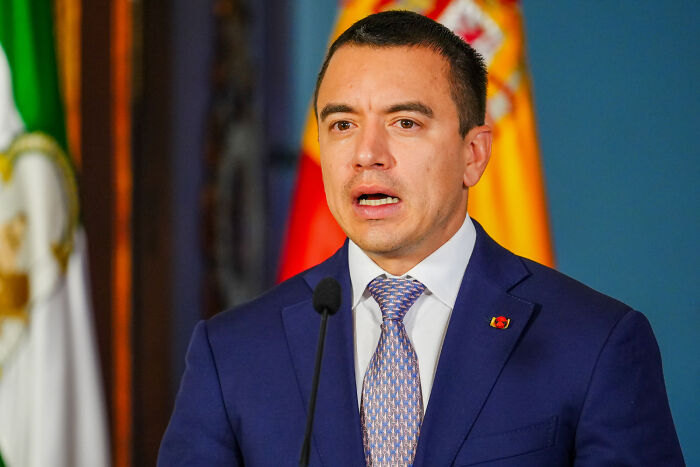
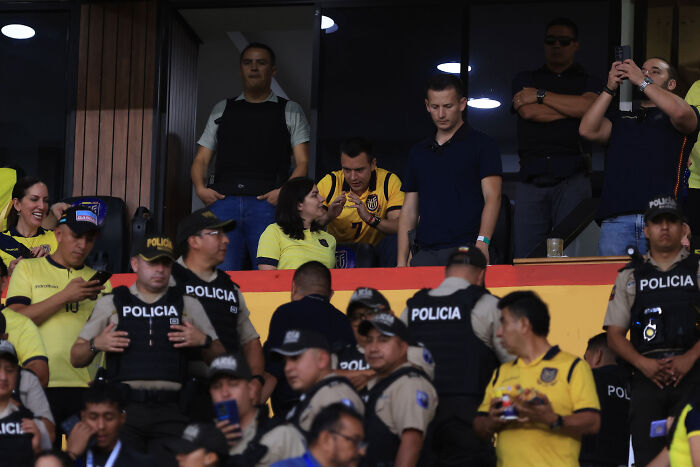



17
0